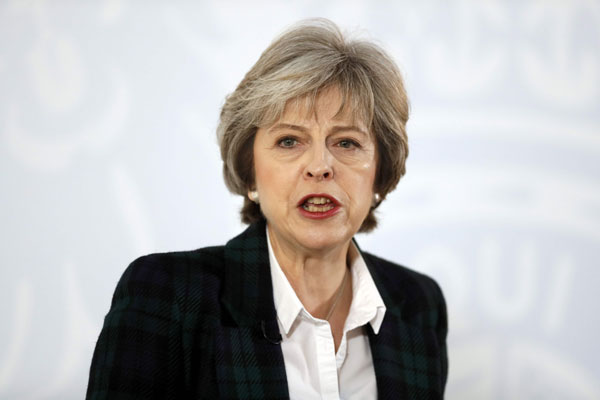May's Brexit takes shape
- By Sumantra Maitra
 0 Comment(s)
0 Comment(s) Print
Print E-mail China.org.cn, January 24, 2017
E-mail China.org.cn, January 24, 2017
|
|
|
Britain's Prime Minister Theresa May delivers a speech on leaving the European Union at Lancaster House in London, January 17, 2017. [Photo/Agencies] |
Now we finally have a fundamental idea of what Brexit is supposed to mean and look like. Brexit means Brexit, was reduced to meaningless tautology for the last few months, but was cleared by British PM Theresa May as going out of the single market of the EU.
May, in a major policy speech, finally said, what everyone had known, that the policy of staying in a single market is not concurrent with the policy which Britain is planning to pursue. Acknowledging the fact that the single market is important, and that Britain would need to do some interim deals with the EU, May had to acknowledge that immigration has been a driver of the Brexit vote, and cutting down net migration figures remains a priority.
May sounded confident and optimistic on the future prospects of the British economy. The address was still low on actual policy, but had two significant developments. The first one was the news of the Chinese goods train reaching the U.K. In a logical continuation of the Belt and Road initiative, and Xi's recent Davos speech, Chinese trade is increasing in Europe. And the U.K. is a significant urban market, and China logically should seek to capitalize on it. The second factor was the open hostility of Donald Trump towards the EU, and Trump favoring a free trade deal with the U.K.
It is for analysts to debate, but in superficial examination, these issues seem connected to the fact that May seems confident enough to venture out in the open market, with a knowledge that the Chinese investment and American free trade deal might be the push for the UK needs to balance off whatever significant drawbacks it might face from an intransigent EU.
But there's more to it than trade, which goes back to history.
It is not fashionable these days to talk about geopolitics, as that is an old fashioned way of conducting international politics in the post-modern world. But patterns of geopolitics emerge. The reality remains, that the EU is by and large the continuation of a German grand strategy from the 1870s. First militarily, and then economically, Germany has sought to dominate Europe. This has been continuously counter-balanced by the external powers of the Russian empire, British empire, and the United States.
The reason is simple. Britain, Russia and the United States despite several differences are great powers, both economically and militarily, and it was in their interest to not let a centralized Europe become dominated by one single great power. As long as France was there to balance the rise of any potential hegemon, the task of these external powers was comparatively easy. That all faltered in the 20th century, with France failing twice to balance the rise of imperial and later Nazi Germany.
After the Second World War, Europe was divided and Germany was broken and powerless. But German objectives and foreign policy remained the same. Germany was always an expanding power, as noted by Peter Hitchens in his phenomenal lecture last year at Keele University. It first wanted to expand in Central and Eastern Europe militarily, and failing that, it attempted the same through economic might.
According to Hitchens, the entire Ukrainian fiasco was therefore a natural reaction between the EU foreign policy dominated by Germany and a natural backlash by Russia. Similarly, Brexit is qualitatively a point in time of a British backlash against German domination.
I wrote last year in my analysis for Center for Land Warfare, how Britain needed to finally reconcile with the truth that if it wants to get out of the EU, it will have no other option than to have a volatile relationship with Germany and the German dominated EU. There is no sugar coating that fact. And in order to do that, Britain will need all the economic might of China, India, Australia and the U.S. British policy should be reoriented to winning these countries over.
The one key way to do that is encouraging massive investment from China and India. Boris Johnson in his recent tour to India tried to do the same, but there's one key problem. Capital won't flow unless there's a quid-pro-quo free movement of Indians and Chinese students who can go, study and work in the U.K. Visa restrictions will be a big problem for the U.K. therefore, and unless that is solved, there's no going forward.
But otherwise, from May's speech, it seems that that prophecy of a hostile Brexit is slowly coming true.
Sumantra Maitra is a columnist with China.org.cn. For more information please visit:
http://www.china.org.cn/opinion/SumantraMaitra.htm
Opinion articles reflect the views of their authors only, not necessarily those of China.org.cn.







Go to Forum >>0 Comment(s)